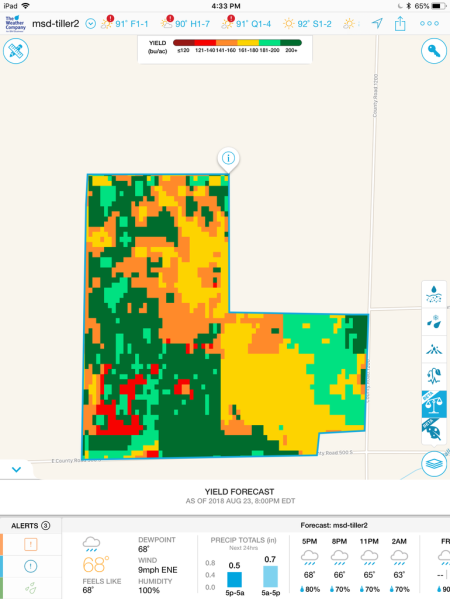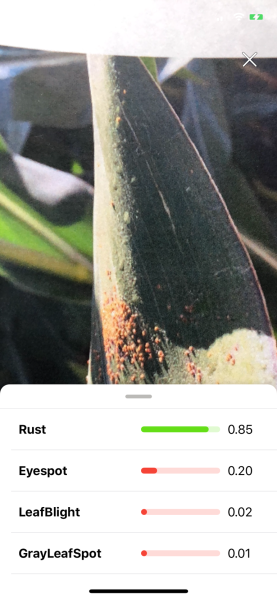Watch all the Transform 2020 sessions on-demand here.
Amber waves of grain, indeed. Roughly 2 million farms dot the continental U.S., and the decisions their proprietors make impact the entire food supply chain. According to one study, if just 5 percent of the U.S. broccoli production isn’t harvested, over 90 million pounds of broccoli go uneaten.
To help stabilize a market often fraught with unpredictability, IBM today launched the Watson Decision Platform for Agriculture, a new platform comprising artificial intelligence (AI), internet of things, and cloud solutions that together generate “evidence-based” insights. It’s available as a managed service offering and part of IBM’s new collection of prepackaged tools pretrained for customer service, human resources, manufacturing, and marketing use cases.
“Farming has always been a complex undertaking that requires growers to manage an interconnected web of pre-season and in-season decisions while at the mercy of mother nature,” the Armonk company wrote in a press release. “With the explosion of data from farm equipment, environmental sensors, and remote input, it’s impractical to rely on intuition or traditional technology to understand what drives variation in yield or provide guidance to growers. [We’re] filling this gap by applying Watson AI to the data to generate the decision support growers need to make confident, evidence-based decisions.”

Above: A satellite view of a crop.
Leveraging the power of IBM’s predictive backend, the Watson Decision Platform for Agriculture highlights any key factors that might affect crop yields, such as soil temperature, moisture levels, crop stress, pests, and diseases. Growers can deploy drones that beam photos to the IBM Cloud for AI-informed trends analysis (to spot signs of crop disease, for instance), or feed up-close photos of plants into disease-detecting computer vision algorithms.
June 5th: The AI Audit in NYC
Join us next week in NYC to engage with top executive leaders, delving into strategies for auditing AI models to ensure fairness, optimal performance, and ethical compliance across diverse organizations. Secure your attendance for this exclusive invite-only event.
Large agricultural operations can tap the platform to predict when harvests are likely to happen and how much they’ll fetch on the global market. And by collating the data coming in, they can identify not only the best irrigation, planting, fertilization, and worker safety practices, but the ideal time of the year to sell a given crop.
Watson Decision Platform for Agriculture isn’t IBM’s first dip into agricultural analytics. Its IBM Pairs Geoscope platform taps machine learning to analyze satellite imagery, weather data (supplied in part by IBM subsidiary the Weather Company), census data, land use, and business location data and crop predictions. In Brazil, its researchers built a prototype — the AgroPad — which uses AI and a mobile app to analyze soil and water samples. And in Kenya, IBM partnered with Twiga Foods to test a blockchain-enabled microfinance lending platform for farmers and food vendors.

Above: A mobile app tapping IBM Watson’s computer vision APIs.
IBM isn’t the only firm applying AI to agriculture, of course. Tel Aviv-based startup Prospera leverages computer vision software, in-field cameras, and climatic sensors, along with a robust cloud processing platform to figure out how much water to deliver to plants in particular locations, for example. Descartes Labs, meanwhile, uses machine learning models trained on satellite data to estimate statewide and countrywide U.S. corn yield estimates, and Abundant Technologies employs computer vision and sensor fusion in its Harvest Croo autonomous strawberry picker.
The innovations couldn’t come soon enough. The United Nations estimates that to feed the Earth’s exploding population, food production will need to increase 50 percent by the middle of the century. With any luck, artificial intelligence will give the industry the boost it needs.
Other new Watson solutions and services launched today include Watson Discovery for Salesforce, which seeks to give customer service agents relevant information about customers’ requests in real time; an HR tool that analyzes the background of top-performing employees and flags promising applicants; IBM Watson Assistant for Marketing; IBM IoT Building Insights; and Watson Supply Chain Insights, which incorporates weather data, traffic reports, and regulatory reports to “provide a fuller picture” of global supply issues.
IBM says it has deployed Watson AI solutions in “thousands of engagements” with clients across 20 industries and 80 countries. It counts Deluxe Corporation, BuzzFeed, H&R Block, Ingersoll Rand, Subway, seven of the 10 largest automotive companies, and eight of the 10 largest oil and gas companies among its customers.


